This piece was originally published in the February 3, 2021 edition of CAP Action’s weekly newsletter, What’s Trending? Subscribe to What’s Trending? here.

Hey, y’all.
As I write this, big, fat snowflakes are falling outside my window, and political Twitter is in a frenzy over an annoying D*ily Be*st story alleging that White House press staffers are — gasp — preparing for press conferences.
Nature is healing.
In this week’s newsletter, we examine the ongoing conversation around President Biden’s executive orders. But first, did you miss last week’s edition? Don’t worry — you can read it here.
WHAT’S TRENDING THIS WEEK
- American Rescue Plan: Congress is poised to vote on Biden’s $1.9 trillion American Rescue Plan, which would provide struggling families with increased financial security, grow the economy, and help control the coronavirus. Despite the plan having overwhelming support from the American people, a group of Republican senators responded with a woefully inadequate proposal of $600 billion — a plan that would severely cut desperately-needed funding for things like reopening schools, child care, housing assistance, state and local aid, and unemployment insurance benefits.
- Executive actions galore: The second week of the Biden presidency was focused on big, swift action through executive actions to help the American people and economy. Biden addressed big issues around climate change, health care, racial equity, and immigration, as well as specific actions like ending the use of private prisons, rescinding the global gag rule, and creating a task force to reunite families separated at the border.
WHAT WE’RE HEARING ON SOCIAL
Two weeks into the Biden presidency, the power of the bully pulpit — and the absence of Donald Trump — is clear. This chart is enough to make any social media-savvy progressive operative weep with joy.
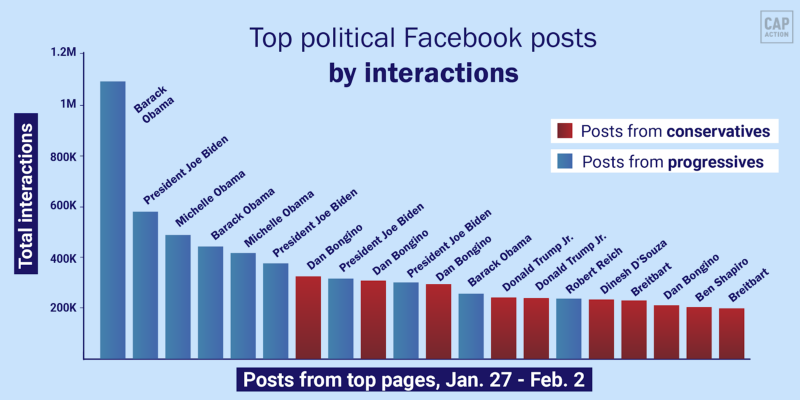 Top 20 best-performing political Facebook posts, by interactions, according to data from NewsWhip.
Top 20 best-performing political Facebook posts, by interactions, according to data from NewsWhip.
Comparing this data to that from the previous week, we continue to see an increase in the number of posts from progressives in the top 10. While we did see a decrease in the number of interactions per post, that is only to be expected following an event like the inauguration.
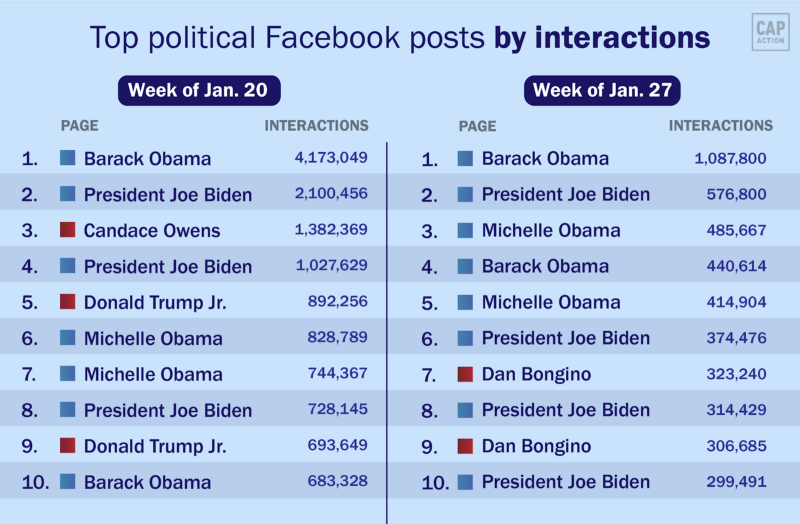 Top 10 best-performing political Facebook posts on the left and right for the weeks of January 20 and 27, by interactions, according to data from NewsWhip.
Top 10 best-performing political Facebook posts on the left and right for the weeks of January 20 and 27, by interactions, according to data from NewsWhip.
Many of the top posts from progressives last week commemorated the life of Cicely Tyson. Several others were “evergreen posts,” or posts that are broadly relevant and not tied to a particular issue or event. One post from President Biden about his executive orders did make the top 10.
Top posts from conservatives varied: Engagement traps asking whether the audience missed key Trump administration officials, Trump’s formation of a new office, and the usual railing against a historic second Trump impeachment.
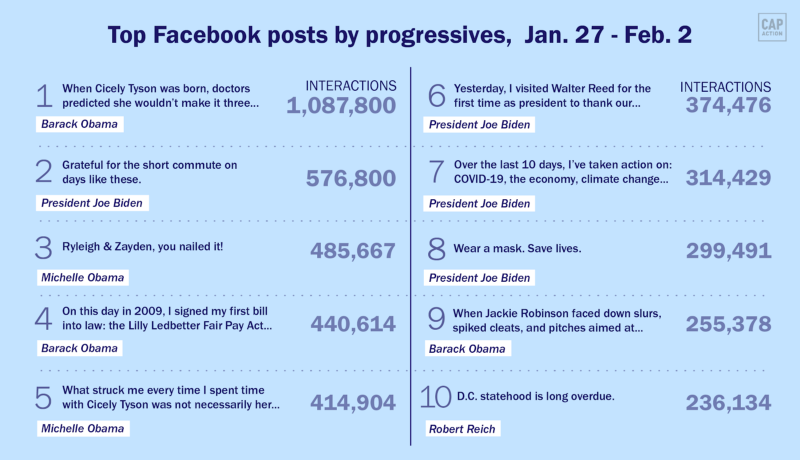 Top ten Facebook posts from progressive pages over the last week, according to data from NewsWhip.
Top ten Facebook posts from progressive pages over the last week, according to data from NewsWhip.
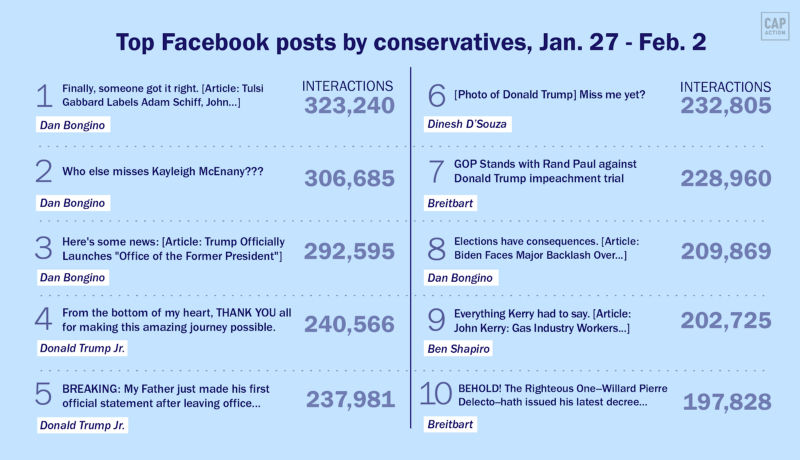 Top ten Facebook posts from conservative pages over the last week, according to data from NewsWhip.
Top ten Facebook posts from conservative pages over the last week, according to data from NewsWhip.
When we isolate data to evaluate content about President Biden’s executive actions, however, the results become more concerning as conservative posts are performing better than average.
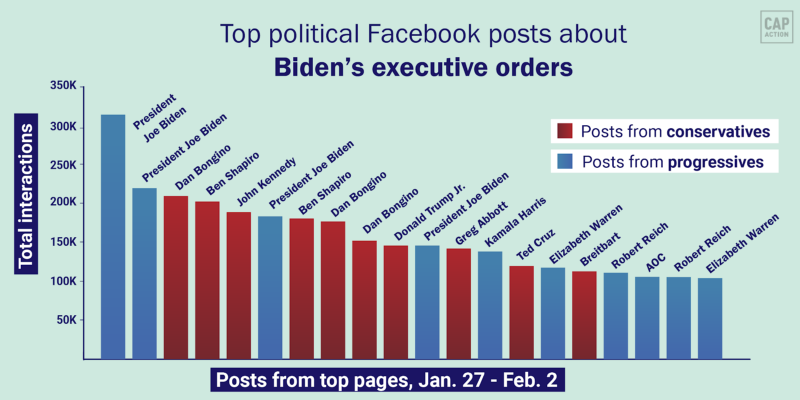 Top 20 best-performing political Facebook posts about executive actions by interactions, according to data from NewsWhip.
Top 20 best-performing political Facebook posts about executive actions by interactions, according to data from NewsWhip.
As you can see in the charts below, the Keystone Pipeline continues to be a useful tool for conservatives to make false, emotional arguments that halting the pipeline would cost jobs. It is essential that progressives do more to refute these claims by employing social best practices that:
- Disprove the false claim that the pipeline would be a “big job creator.” In fact, a State Department report concluded it “would require fewer than 2,000 two-year construction jobs and that the number of jobs would hover around 35 after construction.” And, according to Biden, his climate plan would actually create 10 million new clean energy jobs.
- Debunk the false claim that the pipeline would lower gas prices — the majority of its oil could be sent to overseas markets leading to even higher US gas prices.
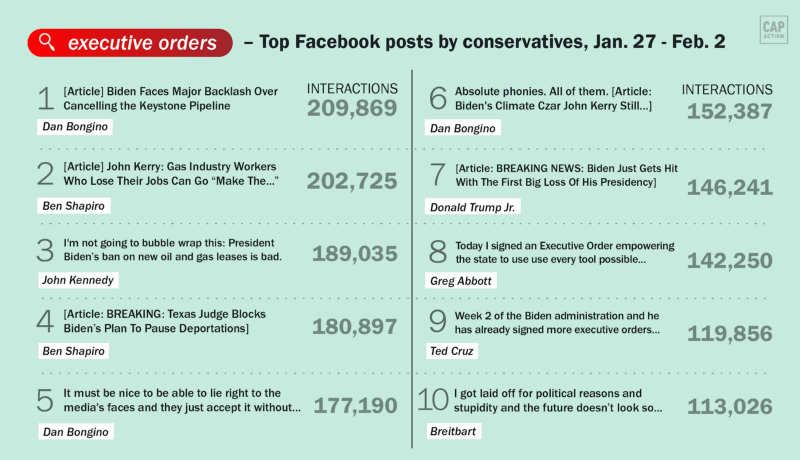 Top ten Facebook posts from conservative pages about executive orders over the last week, according to data from NewsWhip.
Top ten Facebook posts from conservative pages about executive orders over the last week, according to data from NewsWhip.
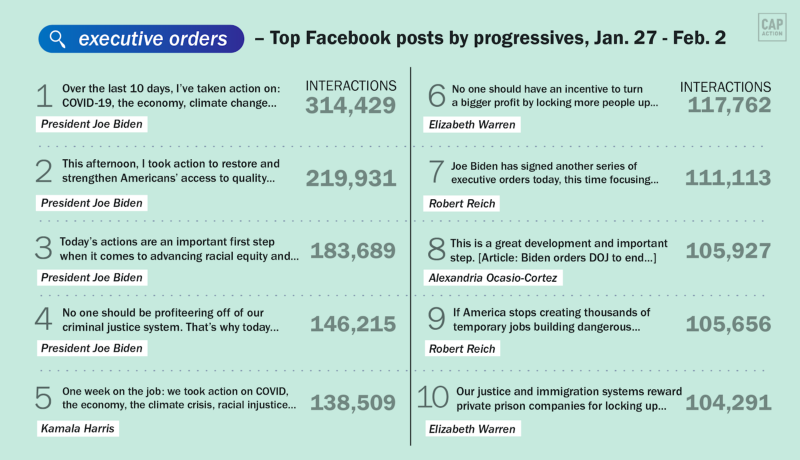 Top ten Facebook posts from progressive pages about executive orders over the last week, according to data from NewsWhip.
Top ten Facebook posts from progressive pages about executive orders over the last week, according to data from NewsWhip.
- Demonstrate support. Telling Americans something is popular actually makes them more inclined to like it. For example, “77% of Americans support another stimulus package.”
- Elevate unlikely supporters. Conservatives are likely to be opposed to most of Biden’s executive actions, so it is important to lift up credible messengers who do support the plan. For example, GM’s announcement that it will sell only emission-free vehicles by 2035.
- Lift up the most popular elements. Many of these are complex pieces of legislation with lots of pieces. Identify some of the most popular pieces and underscore how many Americans will benefit.
- Highlight the most obscene opposition. Conservatives are making a lot of offensive, inappropriate and extreme comments about these actions, blaming Americans and refusing to help them.
- Dismiss the idea that “unity” is defined by “bipartisanship.” “Unity” is what the American people support and what will make a difference in their lives.
ON MY RADAR
- February is Black History Month. Meet the newest Black members of Congress making history this year (including the tie-breaking vote in the Senate, Vice President Kamala Harris) and watch and share this guide featuring five ways white people can fight white supremacy every day (by @MoveOn).
- This week, February 1–7, is National Gun Violence Survivors Week. Honor survivors by reading their stories or finding a memorial event near you via “Moments that Survive,” a project by Everytown for Gun Safety (@Everytown).
ASK ALEX
This week a reader writes, “I’ve noticed a lot of angry reactions and comments on the White House Facebook page. Are those engagements still ‘good’?”
Great question! While the Facebook algorithm remains largely a black box, we do know a few things.
Today, the Facebook algorithm is based primarily on three things:
- Who you usually interact with on the platform,
- Whether the post in question is popular, and
- The type of media in the post.
So from a strictly performance standpoint, more engagements (especially shares and comments) = higher reach = better performance. And it’s worth noting that many times, people use “angry” or “sad” reactions not to express their dislike of a page, but rather to express their emotion on a post. For example, responding with an angry reaction to a story about family separation on a progressive page.
From a brand management perspective, negative comments can certainly be concerning, but as politics is so polarized, especially nationally, we accept them as more acceptable than we would for consumer brands or other organizations. That said, I would argue that one of the things we need to invest more in as progressive social media operatives is proactive community management.
Have a great week,
Alex
P.S. Please do forward along to your friends who are interested or encourage them to sign up here.
This newsletter is written by me, Alex Witt (@alexandriajwitt), a progressive political strategist and Dolly Parton enthusiast (she/her). I’ve managed social media programs for presidential candidates, political committees, progressive advocacy organizations, and more.